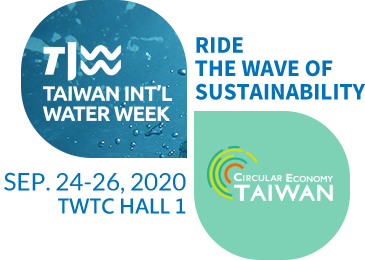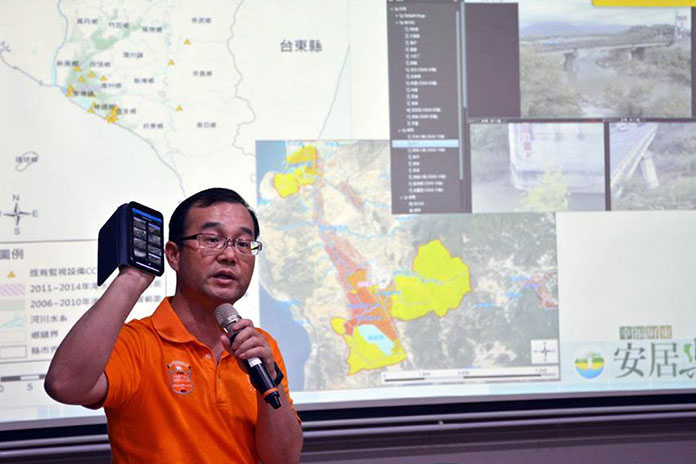Industry News
Smart Water Gives You Peace of Mind during Dry Season

Recently, Taiwanese businessmen keep on returning from China to Taiwan. The movement has driven the domestic economy but tested the stability of industrial water supply at the same time. How to allocate and dispatch water accurately to various sectors has become an urgent challenge. Meanwhile, the rapid progress of big data, Internet of things, artificial intelligence, and cloud technology has enabled the collection of scattered data through mobile devices and widespread environmental sensors. The collected data can then be transmitted to the cloud platform via the communication network for real-time algorithms to produce information needed for public service decision-making. This emergent trend to use smart technologies has also entered the field of water resources, thus driving the growth of the domestic "smart water industry".
Smart water applications in the country cover the management of flood control, rivers, irrigation, reservoirs, groundwater, household water meters, dispatch management, and other fields. The vertical industrial links include upstream equipment, midstream systems, and downstream services. With the recent growth in Taiwan’s various monitoring requirements for water regimes, water consumption, and pollution, the purchases of related hardware have also been increasing; in terms of water scheduling, the miniaturized, wireless, and modular sensors are deployed to accurately control the dynamic information on reservoir water supply and groundwater pumping. Combined with algorithms, such information can be used to construct models to predict regional water regimes.
Many domestic manufacturers have been working in the field of smart water for many years and have formed a variety of overall solutions. Among the exhibitors, the Energy Management System Co., Ltd. provides a variety of smart water meters and the Finetek Co., Ltd. provides a variety of water-related smart sensing and control components, all of which have been applied in the high-tech industry and the domestic tap water industry. In addition, the Unabiz Co., Ltd. provides the Sigfox wireless communication module, which can form a wide area network with high coverage and low power, to serve as a communication solution for the Internet of things in controlling water resources.
Smart water applications in the country cover the management of flood control, rivers, irrigation, reservoirs, groundwater, household water meters, dispatch management, and other fields. The vertical industrial links include upstream equipment, midstream systems, and downstream services. With the recent growth in Taiwan’s various monitoring requirements for water regimes, water consumption, and pollution, the purchases of related hardware have also been increasing; in terms of water scheduling, the miniaturized, wireless, and modular sensors are deployed to accurately control the dynamic information on reservoir water supply and groundwater pumping. Combined with algorithms, such information can be used to construct models to predict regional water regimes.
Many domestic manufacturers have been working in the field of smart water for many years and have formed a variety of overall solutions. Among the exhibitors, the Energy Management System Co., Ltd. provides a variety of smart water meters and the Finetek Co., Ltd. provides a variety of water-related smart sensing and control components, all of which have been applied in the high-tech industry and the domestic tap water industry. In addition, the Unabiz Co., Ltd. provides the Sigfox wireless communication module, which can form a wide area network with high coverage and low power, to serve as a communication solution for the Internet of things in controlling water resources.
In addition, smart water has a number of demonstration cases in Taiwan as a verification field for smart sensing equipment and systems. For example, Mudan Reservoir has used fully automatic high-frequency monitoring (AHFM) technology to plan water quality monitoring networks, Taoyuan and Kaohsiung have deployed smart water meters for groundwater wells, and Chianan Irrigation Association has deployed sensors to adjust irrigation water... etc. The Internet of things for water regimes are established through the extensive deployment of smart water meters, water level gauges, etc., thus strengthening cloud decision-making and remote control, enabling more accurate water usage and distribution for the agriculture, industry, and business sectors, and ensuring the safety of water supply in the dry season.
Not only does the public sector use the above data to refine its water supply scheduling decisions, but by further opening up the data, the private sector can also use the relevant data for value-added activities, generating diversified services, allowing more applications for both private and public sectors, and driving the growth for another wave of data market. It is expected that the sharing of information between the public and private sectors will lead to a more resilient water governance and a new wave of smart business opportunities under the extreme climates.
Not only does the public sector use the above data to refine its water supply scheduling decisions, but by further opening up the data, the private sector can also use the relevant data for value-added activities, generating diversified services, allowing more applications for both private and public sectors, and driving the growth for another wave of data market. It is expected that the sharing of information between the public and private sectors will lead to a more resilient water governance and a new wave of smart business opportunities under the extreme climates.



